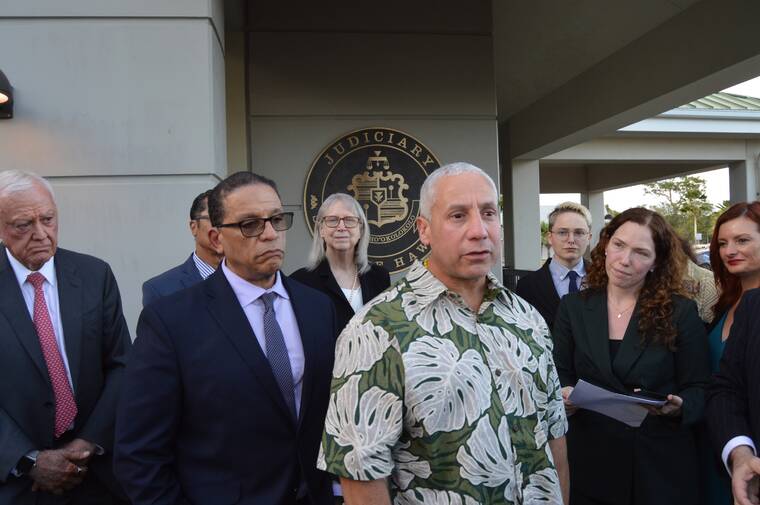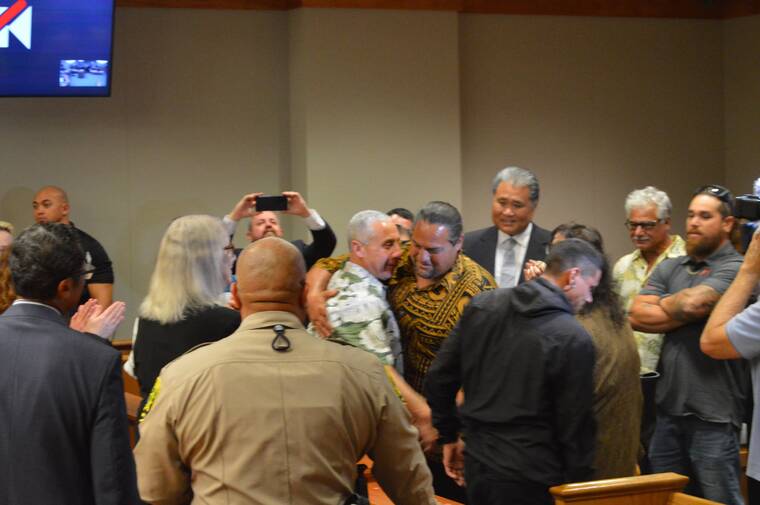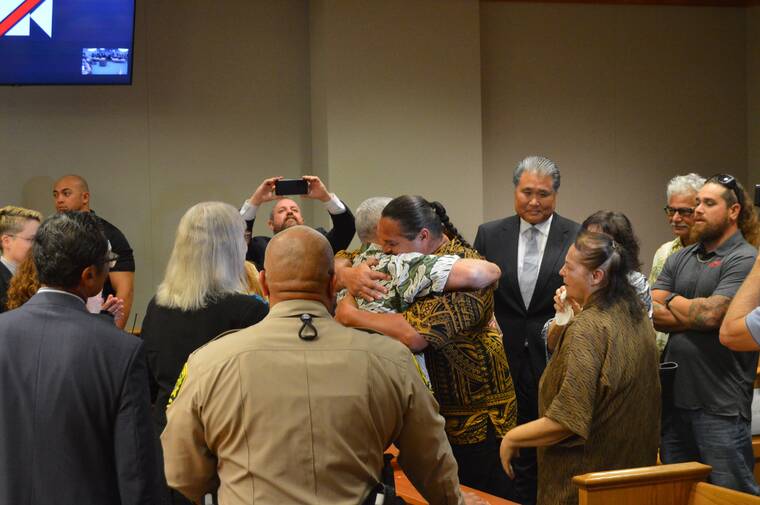Judge overturns Ian Schweitzer’s conviction in Dana Ireland’s rape, murder
A judge on Tuesday ordered that a Puna man who spent 26 years of his life behind bars for perhaps the most notorious murder in Hawaii’s history “be released from his shackles immediately.”
Albert “Ian” Schweitzer, now 51, was convicted in 2000 and sentenced to 130 years in prison for the rape, kidnapping and murder of Dana Ireland on Christmas Eve 1991. He, his brother Shawn Schweitzer, and Frank Pauline Jr. were arrested and charged with the crime in 1997.
ADVERTISING
Hilo Circuit Judge Peter Kubota overturned Ian Schweitzer’s conviction after a daylong hearing detailing new evidence in the case Kubota said exonerated Schweitzer and the others.
Ian Schweitzer said after the hearing he’s “just grateful, very thankful.”
“Give glory to God, the Almighty, my lord and savior,” Schweitzer said. “Thank you for blessing me with my team and family, and thank you to the judge for being an honorable judge and the prosecutor for doing the honorable things and restoring honor in the court system of Hilo.”
The team Schweitzer referred to is the Hawaii Innocence Project and the New York Innocence Project, which filed a petition Monday outlining the additional evidence in the case that led to Tuesday’s hearing.
The Innocence Project’s lawyers argued before Kubota that the Schweitzers and Pauline were exonerated by updated DNA testing, the discrediting of bite mark evidence, and expert testimony that Schweitzer’s 1953 Volkswagen Beetle couldn’t have made the tire tracks left at the site in Kapoho where Ireland’s bicycle was run over and on the remote fishing trail where the dying young woman was discovered.
The 23-year-old Ireland, a recent college graduate from Springfield, Va., had moved to the Big Island to be with her older sister, Sandy. Her murder garnered national attention and remained unsolved for years, putting intense pressure on police to find the killer.
Schweitzer was the last of three Native Hawaiian men convicted of her murder who remained behind bars for the crime.
Pauline, who implicated the Schweitzers in a confession he later recanted, was sentenced to 160 years in prison. Pauline was killed in 2015 in a New Mexico prison yard by a fellow inmate — a day after the Tribune-Herald reported the Hawaii Innocence Project was representing Ian Schweitzer.
Shawn Schweitzer — who was 16 when Ireland’s sexual assault and murder took place — pleaded guilty to manslaughter in a deal with prosecutors. His sentence was reduced to time already served in the case.
He was in the courtroom gallery during Tuesday’s hearing, as were his and Ian’s parents, Jerry and Linda Schweitzer.
Asked after the ruling how he was feeling, Shawn Schweitzer said, “I don’t know how to explain it. Still can’t believed it happened.” He then smiled and started laughing.
The DNA found on several key pieces of evidence in the case — including the bloody blue “Jimmy Z” brand T-shirt three witnesses testified was worn by Pauline the day of the murder — belongs to an individual referred to in court Tuesday as “Unknown Male No. 1.” Kubota suggested that person is the likely culprit in the crime.
“The court has reviewed the credibility of the evidence presented to it, which was not available to the trial in the year 2000 by the way of modern DNA testing, and recently produced evidence regarding the tire tracks left at the Waa Waa site where Miss Ireland was found and bite-mark evidence and testimony — and polygraphic examination of Mr. Shawn Schweitzer,” Kubota said before vacating Ian Schweitzer’s conviction.
The judge noted that prior to the convictions of the Schweitzer brothers and Pauline, “there was a great outrage in the community which may have led to a desire to convict someone — or anyone — for such a brutal crime.” He added the media “can whip up a firestorm that … makes it difficult for even the cool hand of justice to quell.”
Kubota also said the modifications that would need to be made to Schweitzer’s car for it to make the tire tracks found at the two crime scenes would, in essence, turn the small German vehicle into “a VW Bug stretch limousine, which is ridiculous and atrocious.”
“The paramedics that were dispatched to try and save the dying Miss Ireland stopped at the bottom of Kahakai (Boulevard in Pahoa) and were hesitant to go in to the Beach Road because of the potholes, hills and valleys of the roadway,” said Kubota, who noted a request by medics for a 4-wheel-drive vehicle caused delay in the response. “Common sense would say that trained paramedics that were on a mission to save a dying woman would not risk driving into that road, how likely is it three large males with a dying girl is able to drive in with a Volkswagen Bug on that same road?”
After opining that a jury hearing the updated evidence would likely acquit the Ireland defendants, and after vacating Ian Schweitzer’s conviction, the judge addressed the newly freed man.
“You’ve spent roughly half of your life as a free man and another half of your life in prison,” Kubota said. “… The question is, how do you make up for that lost time? And I’ll give you a bit of advice.
“You’ve lived roughly (two-thirds) of your life. You’ve got another third ahead of you. You can live it being angry and resentful at the process and the people that put you there, or you can live it with a new freedom. All right? I suggest that since you have your whole family here, you hug and love your family and live a fulfilled life — and make the best of the next one-third of your life.”
Ken Lawson, co-director of the Hawaii Innocence Project, said after the hearing Kubota’s decision was “a long time coming” and thanked the Innocence Project’s co-founders Barry Scheck and Peter Neufeld.
“A lot of people who don’t live here in Hawaii really don’t understand the impact this case had on this family and community,” Lawson said. “And as Mr. Scheck said in his closing argument, this case was devastating to the Schweitzer family. It wasn’t just about Ian. It devastated his life, but it affected the entire family.
“And when you have a wrongful conviction of this magnitude and of this nature, there’s more than just one victim. You had Dana Ireland; she was a victim. Her family were victims. And then, when you get it messed up, you create more victims by sending innocent people to prison — affecting their families, affecting their lives, and affecting their children.”
Email John Burnett at jburnett@hawaiitribune-herald.com.





